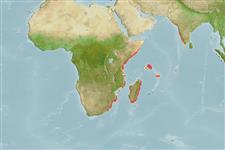>
Mulliformes (Goatfishes) >
Mullidae (Goatfishes)
Etymology: Parupeneus: Latin, parum, parvum = small + Peneus, the name of a river; fraserorum: Named collectively for Michael D. Fraser and Valda J. Fraser..
More on authors: Randall & King.
Environment: milieu / climate zone / depth range / distribution range
Ecologia
marinhas associadas(os) a recifes; intervalo de profundidade 40 - 81 m (Ref. 82839). Tropical
Western Indian Ocean: South Africa and Madagascar.
Tamanho / Peso / Idade
Maturity: Lm ? range ? - ? cm
Max length : 22.3 cm SL macho/indeterminado; (Ref. 82839)
Descrição breve
Chaves de identificação | Morfologia | Morfometria
Espinhos dorsais (total) : 8; Raios dorsais moles (total) : 9; Espinhos anais: 1; Raios anais moles: 7; Vértebras: 24. This species is distinguished by the following characters: 16 or 17 pectoral-fin rays; 6 + 21 or 22 gill rakers; body depth 2.8-2.9 in SL; head length 2.8-2.9 in SL; snout length 1.8-1.85 in HL; posterior margin of maxilla symmetrically convex; barbels 1.3-1.35 in HL; third dorsal spine longest, 1.8-2.0 in HL; longest dorsal ray 3.15-3.3 in HL; penultimate dorsal-fin ray only slightly shorter than last ray; pectoral-fin length 1.2-1.25 in HL; pelvic-fin length 1.35-1.5 in HL; in life, has an orange-yellow stripe following lateral line with body above the stripe pale brown and below stripe white with light blue iridescence centrally in each scale, posteriorly becoming a smaller, more defined spot; scale edges narrowly dark; upper end of gill opening with a dark brown spot about half pupil diameter in height; faint oblique blue lines anterior and posterior to eye; second dorsal and anal fins with wavy blue lines; caudal fin with iridescent blue longitudinal streaks; pectoral fins with a light red bar at base; white barbels (Ref. 82839).
Inhabits sand bottom areas near edge of low profile reefs, usually solitary, occasionally in loose pairs (Ref. 82839).
Life cycle and mating behavior
Maturities | Reprodução | Spawnings | Egg(s) | Fecundities | Larvas
Randall, J.E. and D.R. King, 2009. Parupeneus fraserorum, a new species of goatfish (Perciformes: Mullidae) from South Africa and Madagascar. Smithiana Bull. 10:31-35. (Ref. 82839)
Categoria na Lista Vermelha da IUCN (Ref. 130435)
Ameaça para o homem
Harmless
Utilização humana
Ferramentas
Relatórios especiais
Descarregue XML
Fontes da internet
Estimates based on models
Preferred temperature (Ref.
123201): 23.5 - 26.4, mean 25.4 °C (based on 12 cells).
Phylogenetic diversity index (Ref.
82804): PD
50 = 0.5000 [Uniqueness, from 0.5 = low to 2.0 = high].
Bayesian length-weight: a=0.01202 (0.00556 - 0.02601), b=3.10 (2.93 - 3.27), in cm total length, based on LWR estimates for this Genus-body shape (Ref.
93245).
Nível Trófico (Ref.
69278): 3.5 ±0.4 se; based on size and trophs of closest relatives
Resiliência (Ref.
120179): Médio, tempo mínimo de duplicação da população 1,4 - 4,4 anos (Preliminary K or Fecundity.).
Fishing Vulnerability (Ref.
59153): Low vulnerability (17 of 100).
